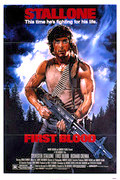
Directed by
Ted Kotcheff
95 minutes
Rated M
Reviewed by
Bernard Hemingway

First Blood
Somewhat remarkably, Sylvester Stallone is identified with two screen and pop cultural icons, Rocky Balboa and John Rambo. First Blood is the film that gave us the latter, a Green Beret Vietnam vet suffering from what is now known as post-traumatic stress disorder, a rootless individual scarred by his experiences in Vietnam and come to a small town in Washington State to visit an old army buddy. He is shocked to find that the buddy has died of cancer, probably as a result of exposure to Agent Orange. While walking aimlessly through town (ironically named “Hope”) when attracts the attention of Sheriff Will Teasle (well played by Brian Dennehy) a bully who orders him out of town. When Rambo refuses and is arrested, the brutality of the officers makes him snap. He escapes custody fleeing into the hills with the police in pursuit. .
First Blood is in many ways a pioneering film with Rambo a template for the muscle bound, artillery-bearing action figure who single-handedly takes out the bad guys in a blaze of pyrotechnics and death-defying stunts. Bruce Willis, Tom Cruise, Matt Damon amongst others have all walked in his shoes. First Blood has the advantage over later incarnations that it doesn’t need to outdo its predecessors (an obligation which its own sequels were under) and in the hands of director Ted Kotcheff’ (he directed the 1971 Australian screen classic Wake In Fright) the action is exciting without being ridiculously excessive (at least in hindsight as in its day it was criticized for its excessiveness). That it is done with just a dash of humour helps us accept it.
The strength of the film however is that, as with Rocky Balboa we get a character with whom we can empathize. Rambo is essentially a wronged man, a real “hero” (as deemed by the US Government which has awarded mum a Congressional Medal of Honour for his work in Vietnam) victimized by small-town bigots who hide behind their badges to enforce “The Law”. Rambo is the classic Hollywood anti-hero best known from the Western, a man who in following his own moral code rather than conforming to public probity (as do the townsfolk who thus become the villains) represents the path of righteousness. More than that though there is a certain pathos to the fact that he is “a machine” dispossessed - a man trained to be a killer by a system which has cast him adrift and scorned by a society for which he thought was fighting. In this respect First Blood is a less polished relative to films like Hal Ashby’s Coming Home (1978), The penultimate scene in which Rambo breaks down in front of his former commander Trautman (Richard Crenna) isn’t particularly well done as Stallone is stronger on survival skills than emoting but it is to the film’s credit that it is willing to humanize Rambo in this way .
FYI: In the source novel by David Morrell Rambo is killed by Trautman, the only person he trusts. Although this would have given the film a powerful closure it was deemed too much of a downer and as it transpired, commercially it proved a wise decision as the film was financial successful enough to generate a sequel, Rambo: First Blood Part II, It was this film that really elevated Rambo to iconic status, in turn generating two further sequels, all three of which amped up the action but lacked the moral and psychological substance.
In one of those twists of fate it was only after both Al Pacino, Dustin Hoffman and Kris Kristofferson turned it down that the part of John Rambo went to Stallone who made the film so much his that he has a writing credit. Apparently the first cut of the film was over three hours long and it was Stallone who suggested cutting it by half and letting the other characters tell Rambo's story.
Want something different?





